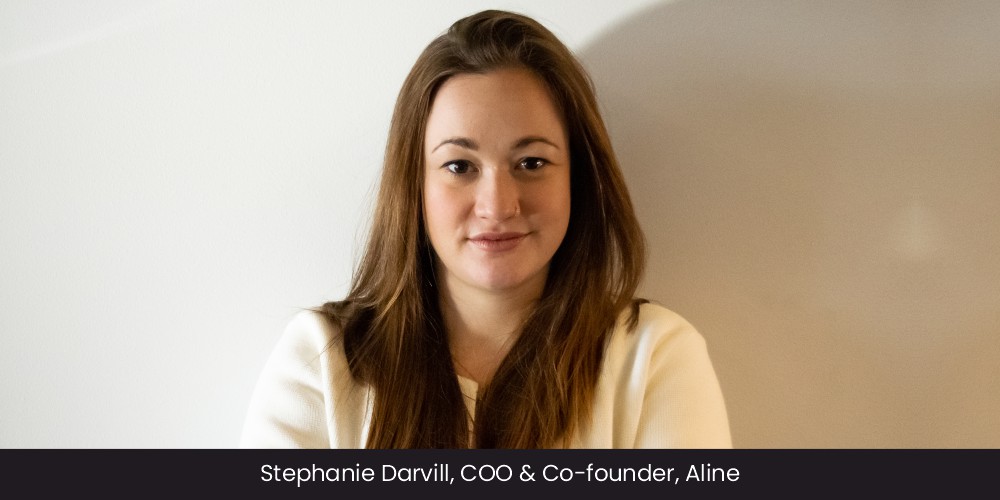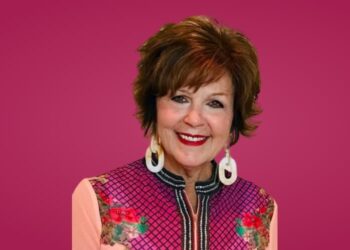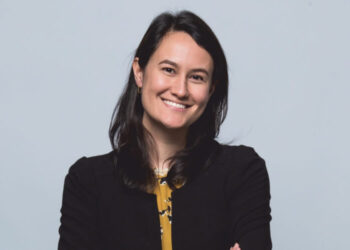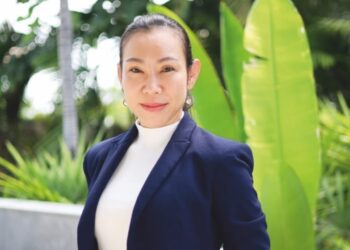Stephanie Darvill is COO and Co-founder of Aline, a learning platform that allows individuals to align their online activity with their learning goals, and companies to align their employees’ learning to the company’s goals.
Stephanie founded the company with her two co-founders, Innocent and Emanuel, at the beginning of 2021, and since then they have gone from strength to strength, testing and building the product. Now the team is ready to onboard the platform’s first customers. She says, “We are revolutionising the way society validates learning. Many people miss out on key professional development opportunities simply because they do not have a formal education, or it is outdated.”
As a result, companies and people alike must constantly refresh their expertise and knowledge throughout their career, the recent so-called Great Resignation and Great Reskilling demonstrating this need, and Aline’s software makes this easy. The company’s purpose is to give more fair learning opportunities, and the first step toward that goal is to use their app, which provides more organized learning with goals and evidence.
Below are highlights of the interview:
Tell us about yourself and your story before founding Aline.
I have always been a very ambitious and adventurous person. I competed at a high level in Taekwondo and kickboxing for 11 years, travelled across several continents and lived in 7 different countries whilst building my career; starting a company is an adventure that I’ve always wanted to do and I believe all my previous life experiences have set me up for the fun ride of an entrepreneurial journey. Before starting Aline, and after getting my degree in International Management and Spanish, I worked in business development for 8 years,, and specialised in consumer insights and market research (which is very useful in the job of validating an MVP!) I’m originally from London in the U.K. and now live in Malmö in Sweden. I speak English and Spanish fluently and have gotten pretty good at my Swedish. I am a very curious person that always wants to find the reason ‘why’ behind people’s behaviours and attitudes and never wants to stop learning.
Why did you choose to become a tech expert?
It wasn’t a direct choice to get into tech, more of a series of events that led me to take this path, and I am very glad that I did take it, developing a company with a mission I strongly believe in. At the same time, just being in this position hopefully shows to people like myself five years ago who doubted whether I could do it, that anyone can do it, and once we’re here, we should try to change it from the inside as the tech and startup world are not the most diverse places.
What are your responsibilities as the founder of the company?
Being a founder is all-encompassing. Even if I don’t lead a certain project, such as the development of the app, I am heavily involved in every aspect of our app launch. In terms of the areas that I consider primarily on my table (and ones I have the most experience in), they are the people and operations of the team, sales, business development, and client and learner engagement. Naturally, as COO, I take on more of the operations of the company.
What have you failed at and how do you overcome challenges?
When I was 26 years old, I burned out, and I considered that, at the time, a huge failure. How could I burn out and need to take sick leave? This was the start of my career, and I felt that admitting I needed help would damage my professional reputation and career prospects. I was suffering from anxiety, panic disorder, severe tinnitus, and hyperacusis (sensitivity to loud sounds); I was having at least one panic attack a day, often in the office, where I would hide in the bathroom until it had passed and then go back to work as normal. It sounds ludicrous now, but at the time, I didn’t think I could admit how much I was struggling. I should have taken sick leave back in 2018, but I refused and dragged myself through the year until May 2019, when my doctors decided for me I needed time off. Even then, I struggled to understand how I could be off for two weeks without ruining my career, I was off for five months in the end, and it was the best thing for my overall health and my career both then and now. So my failure was in not accepting I needed rest and help earlier.
Kindly describe how you will specifically know what success looks like for you. And what has been the best recognition that you received as a professional.
Success isn’t an end destination in my opinion, it’s the journey that is important and with every success, the journey extends. I have always said that I will continue doing any activity for as long as I am enjoying it, and believe in it. When I stop enjoying something, I see what I can change to go back to enjoying it, if there’s nothing I can do, then it’s a sign I should move on. Directly linked to Aline, success for me would be providing professional opportunities for millions of curious learners and being the most engaging edtech app out there.
The best recognition I have received is when one of my direct reports came up to me, months after she had left, and said that she still repeats a lot of the words I told her such as to take it one step at a time, to ride the emotions and waves of energy we have, and above all, be proud of her skills and achievements (she was, and still is, an incredible designer b.)
What advice would you give to the next generation of leaders?
I want to advise the next generation to not feel like they have to ‘fill a role’ or just put up with the first few years of being belittled as ‘one day they will be in that position’. However, from what I have seen, they are already doing this. I see a passion and grit in the next generation that previous generations haven’t been confident enough to have, and for that, I am incredibly optimistic about how they will shape the future of tech. I can’t wait to have future generations as leaders of Aline and take us to the heights of success I am sure we will have.
What are your future plans to sustain the company’s and your success?
We have created the app based on continuous feedback from our early adopters, and I do believe that every product release Aline makes will be rooted in what the market, and our customers, want from a platform like ours. Ultimately, leaders need to remember that your product is a solution to a need or problem that an individual has. Your product is not the end destination, it’s a means to get there, so always go back to what value you are offering to the customers, not what your product does.
Website: www.alinebetter.com





